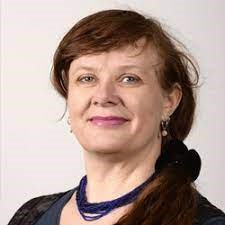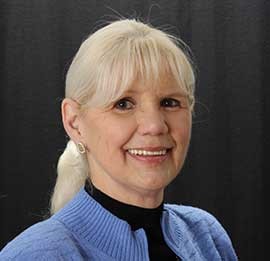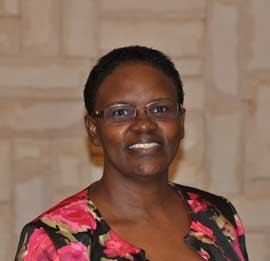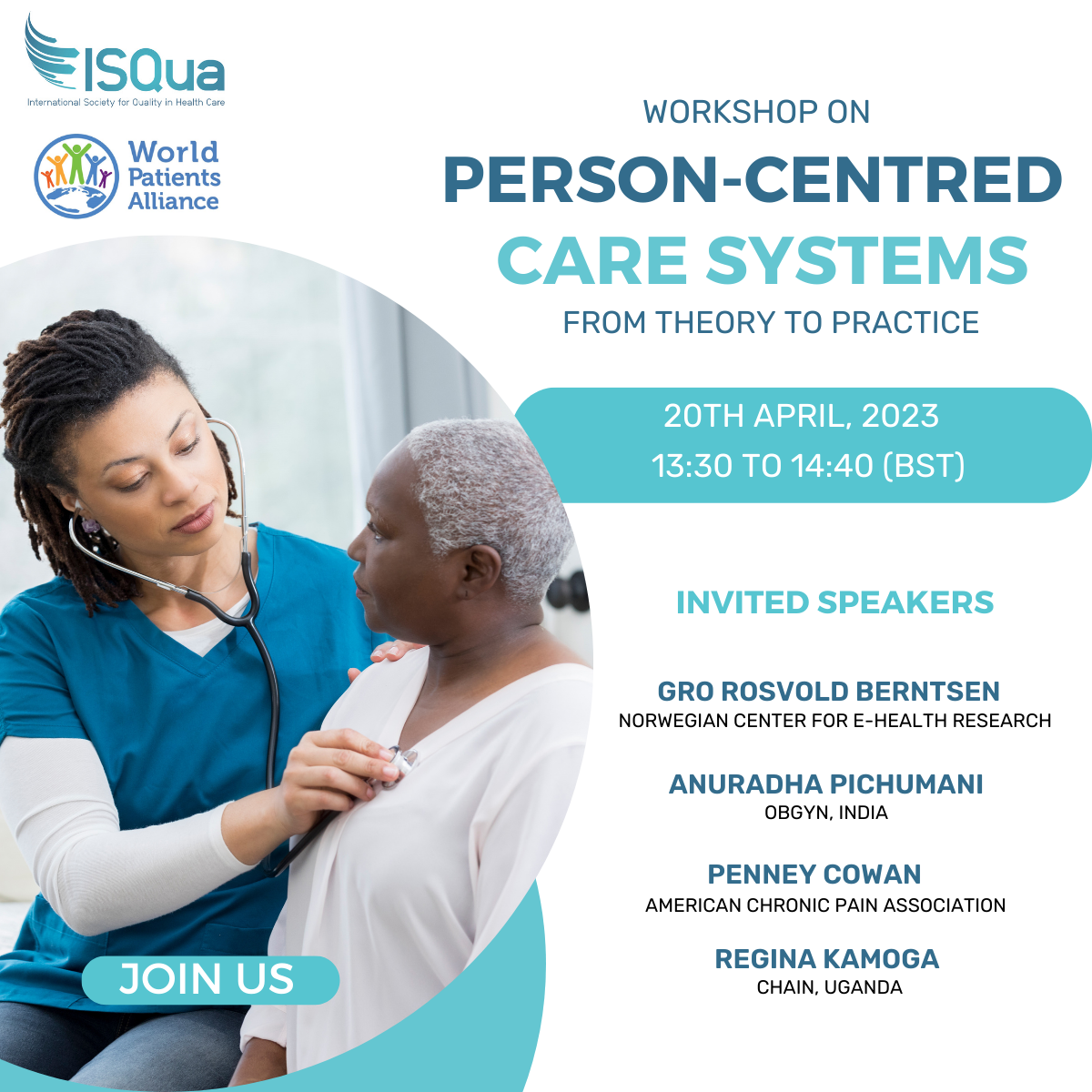
Workshop on Person-Centred Care Systems: From Theory to Practice
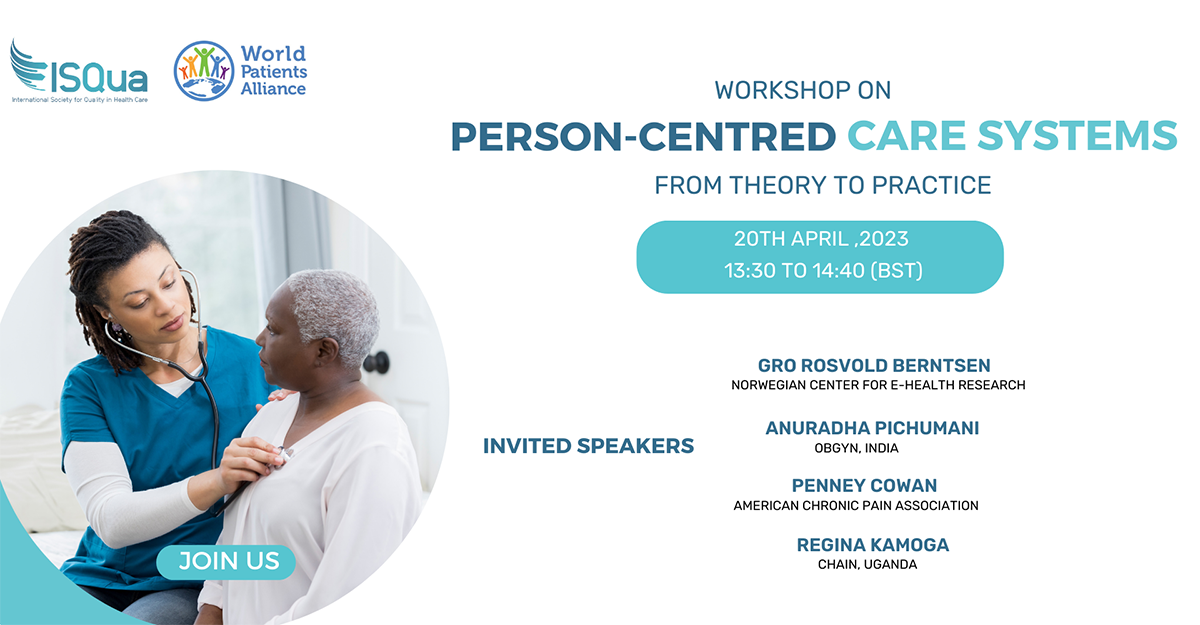
World Patients Alliance (WPA) & International Society for Quality in Health Care (ISQua) jointly hosted a workshop based on the recently published white paper – 'Person-Centred Care Systems: From Theory to Practice'. In order to make Person-Centred Care (PCC) an expected standard of care, we need to systematically redesign legislation, organisation, funding, information systems, education, and research. This ambitious White Paper aimed to answer the most difficult question: how do we embed PCC into our systems, and how do we make it the expected norm?
The workshop started with welcome addresses by Andrew Spiegel, Chair WPA and Dr Carsten Engel, CEO ISQua. Anna Edwards, Chair, Person and Family Centred Advisory Council, ISQua was the moderator of the event and introduced the Workshop. The first speaker of the workshop was Dr. Gro Rosvold Berntsen, Norwegian Center for E-Health Research, Norway and lead author of the Whitepaper. Dr Berntsen highlighted that both patients and health professionals have repeatedly voiced a vital concern that health care is currently not paying sufficient respect to the individuality and human dignity of persons who seek help from care systems. In order to make person-centred care the norm, there is a need to systematically redesign legislation, organization, funding, information systems, education, and research. The aim is to design person-centred care into the system so that person-centred care is the logical choice and is expected and rewarded. Dr Anuradha Pichumani, Executive Director, Sree Ranga Hospital, Chengalpattu, India presented on how PCC is successfully integrated in her hospital in Chengalpattu, India. She briefed about the steps taken in this regard, which included listening to patients voice, using patient journey to support the system, collaboration with the community, patient engagement in the patient safety, using digital tools for PCC, patient and family advisory council and measurement & evaluation of PCC.
The presentations were followed by a panel discussion in which both the speakers were joined by two leading patient advocates Penney Cowan, American Chronic Pain Association and Regina Kamoga, Community Health and information Network Uganda. Penney Cowan said that healthcare providers must respect patients as persons and it is very important to understand what our goals are not only as patients but also as persons. Patients have certain rights and needs to be treated with respect. It must be made sure that our voice is heard and that we are atthe center of care. Not a bystander, but we have to be in the center of the team. Regina Kamoga said that for me, the recognition that I'm just not a body, a passive receiver of care, but one with a mind who can make contribution to their treatment processes. To be part of the decisions. I think for me, that alone makes the whole difference. The health care providers must make us feel better as patients don’t only have physical needs, but also emotional needs.
Hussain Jafri, Executive Director, WPA gave the closing remarks at the end of the workshop.
Please click here for presentations of the Workshop.
Workshop Programme
|
1 |
Welcome – Andrew Spiegel, Chair WPA – Dr Carsten Engel, CEO ISQua
|
|
2 |
Introduction to Workshop – Anna Edwards, Chair, Person and Family Centred Advisory Council, ISQua
|
|
3 |
Person-Centred Care Systems: From Theory to Practice – ISQua Whitepaper – Gro Rosvold Berntsen, Norwegian Center for E-Health Research, Norway; and lead author of the Whitepaper
|
|
4 |
Implementation of PCC – Anuradha Pichumani, Executive Director, Sree Ranga Hospital, Chengalpattu, India
|
|
5 |
Panel Discussion – Penney Cowan, American Chronic Pain Association – Regina Kamoga, Community Health and information Network Uganda – Gro Rosvold Berntsen, Norwegian Center for E-Health Research – Anuradha Pichumani, Sree Ranga Hospital, Chengalpattu, India – Moderated by Anna Edwards, Person and Family Centred Advisory Council, ISQua
|
|
6 |
Closing Remarks – Dr Hussain Jafri, Executive Director WPA – Dr Carsten Engel, ISQua
|
Speakers Biographies

